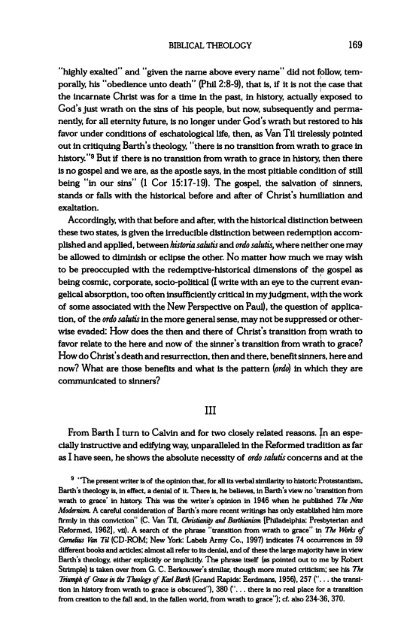NEW TESTAMENT THEOLOGY
Issues%20in%20New%20Testament%20Theology
Issues%20in%20New%20Testament%20Theology
You also want an ePaper? Increase the reach of your titles
YUMPU automatically turns print PDFs into web optimized ePapers that Google loves.
BIBLICAL <strong>THEOLOGY</strong> 169<br />
"highly exalted" and "given the name above every name" did not follow, temporally,<br />
his "obedience unto death" (Phil 2:8-9), that is, if it is not the case that<br />
the incarnate Christ was for a time in the past, in history, actually exposed to<br />
God's just wrath on the sins of his people, but now, subsequently and permanently,<br />
for all eternity future, is no longer under God's wrath but restored to his<br />
favor under conditions of eschatological life, then, as Van Til tirelessly pointed<br />
out in critiquing Barth's theology, "there is no transition from wrath to grace in<br />
history." 9 But if there is no transition from wrath to grace in history, then there<br />
is no gospel and we are, as the apostle says, in the most pitiable condition of still<br />
being "in our sins" (1 Cor 15:17-19). The gospel, the salvation of sinners,<br />
stands or falls with the historical before and after of Christ's humiliation and<br />
exaltation.<br />
Accordingly, with that before and after, with the historical distinction between<br />
these two states, is given the irreducible distinction between redemption accomplished<br />
and applied, between historia salutis and ordo salutis, where neither one may<br />
be allowed to diminish or eclipse the other. No matter how much we may wish<br />
to be preoccupied with the redemptive-historical dimensions of the gospel as<br />
being cosmic, corporate, socio-political (I write with an eye to the current evangelical<br />
absorption, too often insufficiently critical in my judgment, with the work<br />
of some associated with the New Perspective on Paul), the question of application,<br />
of the ordo salutis in the more general sense, may not be suppressed or otherwise<br />
evaded: How does the then and there of Christ's transition from wrath to<br />
favor relate to the here and now of the sinner's transition from wrath to grace?<br />
How do Christ's death and resurrection, then and there, benefit sinners, here and<br />
now? What are those benefits and what is the pattern (ordo) in which they are<br />
communicated to sinners?<br />
Ill<br />
From Barth I turn to Calvin and for two closely related reasons. Jn an especially<br />
instructive and edifying way, unparalleled in the Reformed tradition as far<br />
as I have seen, he shows the absolute necessity of ordo salutis concerns and at the<br />
9 ' 'The present writer is of the opinion that, for all its verbal similarity to historic Protestantism,<br />
Barth's theology is, in effect, a denial of it. There is, he believes, in Barth's view no 'transition from<br />
wrath to grace' in history. This was the writer's opinion in 1946 when he published The New<br />
Modernism. A careful consideration of Barth's more recent writings has only established him more<br />
firmly in this conviction" (C. Van Til, Christianity and Barthianism [Philadelphia: Presbyterian and<br />
Reformed, 1962], vii). A search of the phrase "transition from wrath to grace" in The Works of<br />
Cornelius Van Til (CD-ROM; New York: Labels Army Co., 1997) indicates 74 occurrences in 59<br />
different books and articles; almost all refer to its denial, and of these the large majority have in view<br />
Barth's theology, either explicitly or implicitly. The phrase itself (as pointed out to me by Robert<br />
Strimple) is taken over from G. C. Berkouwer's similar, though more muted criticism; see his The<br />
Triumph of Grace in the Theology of Karl Barth (Grand Rapids: Eerdmans, 1956), 257 ("... the transition<br />
in history from wrath to grace is obscured"), 380 ("... there is no real place for a transition<br />
from creation to the fall and, in the fallen world, from wrath to grace"); cf. also 234-36, 370.


